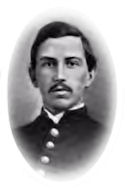July 3rd – 4th, 1862.
EARLY this morning a detachment of cavalry, artillery, and infantry was sent back to recover the guns abandoned yesterday. No signs of the enemy were found until near the woods on the further side of the battle ground, where there was a picket line, which withdrew at their approach. They reported the enemy’s dead as something astonishing, covering the fields, in many places piled up several deep. They did not press the enemy but returned to camp, bringing in the guns and everything else abandoned. In the afternoon, a section of rebel guns opened upon the camp directly in our front, sending their shells whistling over our heads, to explode amongst the teams in rear. The Fifth Maine regiment was ordered to make a detour through the woods and try to capture them, which they succeeded in doing without loss. The guns were part of a horse battery on a reconnoitering expedition; every man belonging to it was brought into camp with the guns, without loss on our side.
For the first time since the thirtieth of May, the bands were permitted to play and soon put the troops in good humor. The day was exceedingly pleasant, and at night we turned in and undressed, getting out of harness for the first time in thirty-five days.
I mounted guard this morning with all the formality prescribed by the regulations, in presence of a great crowd of visitors, besides our own men; drums and bugles beat off, making us all happy again. In the evening the regiment made a very gallant appearance at dress parade, and after the evolutions, listened to the following circular which I read in front of the regiment.
Circular
July 3, 1862. A national salute will be fired at noon to-morrow, at the headquarters of each army corps. Immediately thereafter, the bands will play appropriate national airs. The general commanding will visit all the troops during the afternoon, when the troops will be paraded, and a major general’s salute fired in each corps. The troops will be notified of the hour of the visit.
By command of
Major General McClellan,
S. Williams., A. G.
Also the following, dated July 3rd, from headquarters, Army of the Potomac:
Soldiers of the Army of the Potomac:—Your achievements of the last ten days have illustrated the valor and endurance of the American soldier; attacked by superior forces and without hope of reinforcement, you have succeeded in changing your base of operations by a flank movement, always regarded as the most hazardous of military expedients. You have saved all your material, all your trains, and all your guns, except a few lost in battle, taking in return, guns and colors from the enemy; upon your march you have been assailed day after day with desperate fury by men of the same race and nation, skilfully massed and led. Under every disadvantage of numbers and necessarily of position also, you have in every conflict, beaten back your foes with enormous slaughter. That your conduct ranks you among the celebrated armies of history, no one will ever question; then each of you may always say with pride, “I belonged to the Army of the Potomac.” You have reached the new base, complete in organization, and unimpaired in spirit. The enemy may at any time attack you; we are prepared to meet them; I have personally established your lines. Let them come and we will convert their repulse into a final retreat! Your Government is strengthening you with the resources of a great people. On this our Nation’s birthday, we declare to our foes, who are rebels against the best interests of mankind, that this army shall enter the capitol of the so-called Confederacy, that our National Constitution shall prevail, and that the Union, which can alone insure internal peace, and external security to each state, must, and shall be preserved, cost what it may, in time, treasure, and blood.
General G. B. Mcclellan.
We were a good deal amused at this Napoleonic and spread eagle address, but the men cheered it on parade, and seemed to think it very fine.
Directly after guard mount, Broom and I rode over to the landing to get a view of the river; we were surprised at its width. It makes a big bulge here and must be nearly a mile across. We looked up McKim and the brigade hospital fellows, whom we found busily engaged shipping the sick and wounded men away on transports. The river is crowded with all sorts of vessels, and the landing reminds one of a busy seaport city. Several gunboats lay at anchor in the stream, part of a regular James river flotilla which patrols the river from Turkey Bend to Fortress Monroe. We were delighted to get amongst the busy throng of workers, and see the water, boats, and ships; after so much experience, in which one’s range of vision is so limited, it gives one a zest for the water almost indescribable.
The doctor gave us a piece of ice, and from other sources we got several bottles of wine, which we sent to our quarters by Kelly, Broom’s man. On our return, Seth dug a hole which he called a wine cellar, at the foot of Broom’s bed, in which he placed the ice and wine wrapt in a blanket. It kept pretty well, considering the heat.
The review took place during the afternoon, and was quite a success. The men looked well, their clothes a little shabby, but altogether soldierly, and business like. We performed no duty during the day, other than the guard mounting and review; celebrating the Nation’s birthday by taking a good long rest, and generally cleaning up. In the evening, Seth proved himself a connoisseur in the matter of mixed drinks, a luxury to which we had long been strangers.



